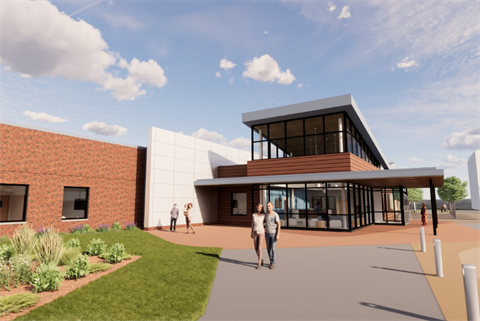Cabarrus ushers in new era of behavioral healthcare
Published on May 24, 2024

On a recent Saturday morning, a dedicated group of advocates gathered at Frank Liske Park for a singular goal: to raise awareness about mental health.
They came from diverse backgrounds: government, public safety, healthcare, non-profit organizations and more, to participate in the National Alliance on Mental Illness (NAMI) Walk.
The event, held in recognition of Mental Health Awareness Month, served as a show of solidarity and a beacon of hope for a future with plentiful mental health resources.
The drive to address mental health soon enters a new chapter when construction begins on the Regional Behavioral Health Center. During a Board of Commissioners meeting earlier this month, Assistant County Manager Aalece Pugh requested the use of Medicaid funds to help cover startup costs for the planned 59,000-square-foot facility. Commissioners approved the request.
Pugh said the funds would be used by Monarch, the organization that will operate the facility, to hire key clinical personnel “so we are ready to open the doors” when construction is complete.
The planned opening is early 2026. That year marks a full decade since commissioners first formed the Mental Health Advisory Board. The group—made up of elected officials, mental health providers, medical practitioners, law enforcement and court officials and human services and school system representatives—is a vital part of the County’s response to behavioral health concerns.
Their work highlighted the growing need for local services and launched a variety of efforts, including training in mental health first aid for County employees and partner organizations, hiring of mental health specialists for local school systems, establishment of the Stepping Up program at the Cabarrus County Detention Center and more.
Board of Commissioners Chair Steve Morris recalls conversations with community members impacted by the lack of local resources for mental health emergencies.
“That’s where I learned the importance of trying to create an alternative place for people to go,” Morris says.
Morris saw the impact behavioral health urgent care facilities had made in other areas around the country, but turning the idea into reality required the support of more than just the County.
Senator Paul Newton and Representative Kristin Baker helped secure $32.5 million in state funding for the center.
Charlotte’s human eXperience designed the facility. Messer Construction is the building contractor.
From its inception, the center went through several iterations before arriving at a single location offering a full “continuum of care.”
That includes a Behavioral Health Urgent Care (BHUC), a Child and Adolescent Psychiatric Residential Treatment Facility (PRTF) and a Facility-Based Crisis (FBC) program.
In conjunction with development of the center, the County established an internal department that focuses on community partnerships and care navigation for residents.
The Behavioral Health Department is a division of the County’s Department of Health and Human Services, which also includes Social Services, Veterans Services and Transportation.
Earlier this year, Dr. Kamilah McKissick was hired as Behavioral Health Director.
McKissick, a licensed psychologist, brought decades of experience to the role. She says the department's biggest goal is to provide behavioral health care to everyone who needs it.
The Regional Behavioral Health Center will help make that happen, she says.
“My greatest hope for the center is to have all these innovative and creative services under one roof so people feel like they have a resource that they can go to for themselves, their families and loved ones and receive the treatment and healing that they need,” she says.
Part of McKissick’s role involves close collaboration with several local organizations, including Cabarrus Health Alliance, Daymark Recovery Services, Partners Health Management and others.
Her department also includes the County’s Behavioral Health Navigator, a position responsible for making sure clients are connected to the community services they need.
Tyrone Elijah, who first joined the County as a clinician in the Stepping Up Program, serves in that role.
During his tenure with Stepping Up, Elijah experienced the need for diverse mental health services.
“We found that a lot of people are in that situation due to mental illness, and the Stepping Up Program played a big role in identifying those individuals and helping them gain access to treatment while incarcerated and once they are released,” he says.
Now, as navigator, he’s taken an even larger role in helping residents find the services they need.
Elijah recalls his first day on the job, and during orientation hearing from County Manager Mike Downs about the behavioral health efforts, including plans for the center.
“It was an affirmation to me that I had made the right career move,” he says. “It helped me know I was in the right place.”
Stepping Up has transitioned to operating through the Cabarrus Health Alliance, but the Behavioral Health Department continues to work closely with the program to maintain resource connections.
For the past several years, those connections have served as a testament to a shared commitment to prioritizing the wellbeing of Cabarrus residents.
That, officials say, will help build a future of accessibility.
“Cabarrus County has identified the gaps in crisis services in our community and is proactively addressing them through funding, resources and supporting other services available.
“Long-term or even medium-term, you will be able to feel the change,” Pugh says.
To hear more about Cabarrus County's behavioral health initiatives, listen to the latest episode of the Did Y’all Hear? podcast. "Opening Doors to Hope: CabCo’s Focus on Behavioral Health” is available for streaming and downloading on Spotify, Apple Podcasts and many other podcast platforms or at https://bit.ly/CabCoPodcast.